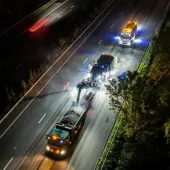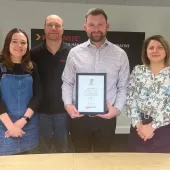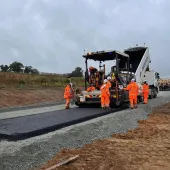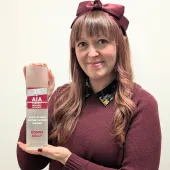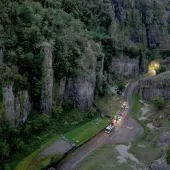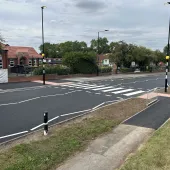SuperCurve resurfacing at the Port of Liverpool

Aggregate Industries provide an enhanced surface course for highly stressed areas at key port facility
AGGREGATE Industries’ say their new SuperCurve asphalt solution has proved exceptionally capable of withstanding high levels of heavy goods vehicle (HGV) traffic following the recent resurfacing of carriageways at the Port of Liverpool.
A vital system for the transportation of goods entering the port, large numbers of HGVs going in and out of the port every day had in recent years taken a toll on the existing carriageway’s hot-rolled asphalt (HRA) surface, causing deterioration of the longitudinal joints.
Sefton Council proposed renovating the area around Princess Way Roundabout/Crosby Road South highway at the Seaforth end of the docks, and the carriageway from the port exit to the roundabout under the A565 flyover.
Having previously worked successfully with road surfacing contractors Dowhigh and Sefton Council on a number of local resurfacing projects, Aggregate Industries were once again called in to offer their expertise in traffic management and associated vehicular issues.
For Dowhigh, in particular, it was important to find an alternative to HRA that would prove both durable and long-lasting, and capable of withstanding the high levels of HGV traffic on this busy route.
As such, Aggregate Industries’ suggested the use of their new SuperCurve product – a high-performance 10mm polymer-modified asphalt designed and engineered to provide an enhanced surface course for high-stress areas.
During the project, Dowhigh’s surfacing gang and Aggregate Industries plant staff faced stringent time restraints from Sefton Council, Highways England and Liverpool Port, as the main road needed to be operational as quickly as possible.
For work to take place on the busy route, overnight road closures and traffic diversions would need to be put in place, which were agreed by Highways England, Sefton MBC, Port of Liverpool and Merseyside Police.
Maintaining their reputation for working quickly and efficiently, careful planning by the Aggregate Industries team saw Phase 1 completed between 10am and 3pm in 2017, and Phase 2 finished between 8pm and 2am in 2018, causing minimal disruptions and meeting the client’s limited time frame.
The process involved Dowhigh laying SuperCurve using two of their pavers working in echelon, which minimized the longitudinal and cross-joints at the point where HGVs would travel into the port.
In addition, the carbon footprint of the project was significantly reduced thanks to Aggregate Industries’ tailored delivery strategy. Delivered direct from the firm’s asphalt plant in Bootle, it took a seven-mile round trip to supply 1,022 tonnes of SuperCurve.
Meanwhile, excavated materials that were not needed were transported to Dowhigh’s recycling depot, which entailed just a four-mile round trip.
Charlotte O’Connell, territory sales manager at Aggregate Industries, said: ‘As a busy main route in and out of the Seaforth Docks at the Port of Liverpool, this stretch of carriageway sees large volumes of HGVs passing through day after day, which, unsurprisingly, led to the rapid deterioration of the existing surface.
‘With extensive industry knowledge and expertise in creating bespoke asphalt solutions, we’re delighted our pioneering new SuperCurve has succeeded in creating a durable and long-lasting surface, and that we were able to successfully meet the client’s ambitious surfacing schedule.’
Peter Allard, director at Dowhigh, said: ‘Having worked with Aggregate Industries on a number of other local road surfacing projects, we were really impressed by their exceptional customer service and innovative asphalt solutions. When it came to the Port of Liverpool, we were keen to use a material offering enhanced strength and longevity, and SuperCurve didn’t disappoint.’



